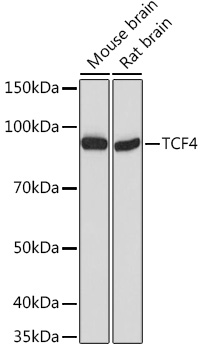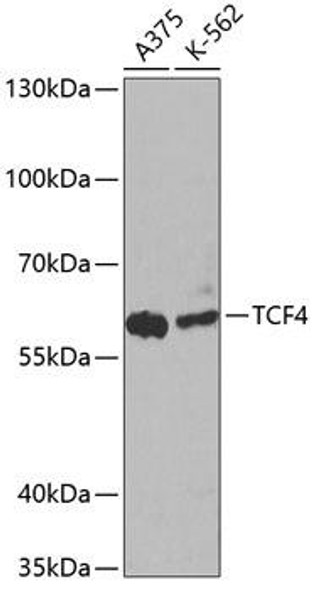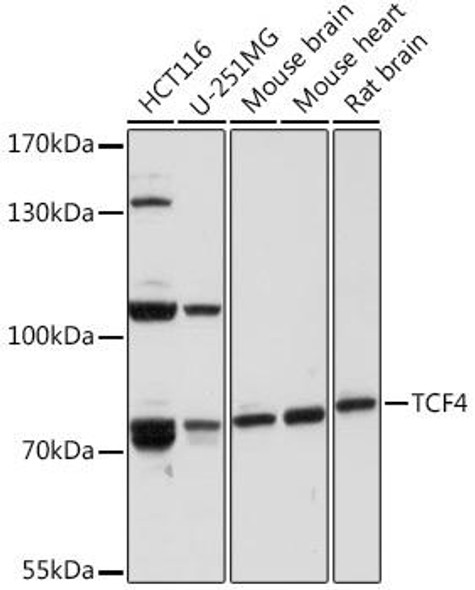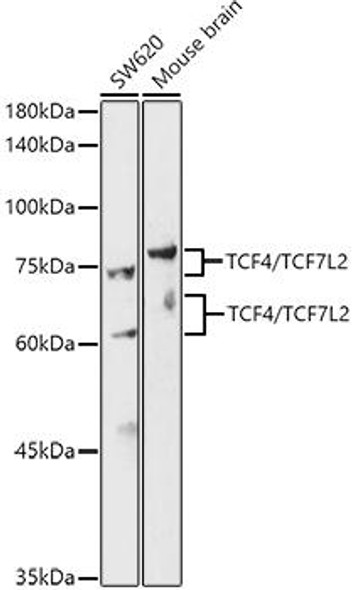Developmental Biology
Anti-TCF4 Antibody (CAB15000)
- SKU:
- CAB15000
- Product Type:
- Antibody
- Reactivity:
- Human
- Reactivity:
- Mouse
- Reactivity:
- Rat
- Host Species:
- Rabbit
- Isotype:
- IgG
- Antibody Type:
- Polyclonal Antibody
- Research Area:
- Developmental Biology
Description
| Antibody Name: | Anti-TCF4 Antibody |
| Antibody SKU: | CAB15000 |
| Antibody Size: | 20uL, 50uL, 100uL |
| Application: | WB |
| Reactivity: | Human, Mouse, Rat |
| Host Species: | Rabbit |
| Immunogen: | Recombinant fusion protein containing a sequence corresponding to amino acids 400-500 of human TCF4 (NP_001077431.1). |
| Application: | WB |
| Recommended Dilution: | WB 1:500 - 1:2000 |
| Reactivity: | Human, Mouse, Rat |
| Positive Samples: | Mouse brain, Rat brain |
| Immunogen: | Recombinant fusion protein containing a sequence corresponding to amino acids 400-500 of human TCF4 (NP_001077431.1). |
| Purification Method: | Affinity purification |
| Storage Buffer: | Store at -20°C. Avoid freeze / thaw cycles. Buffer: PBS with 0.02% sodium azide, 50% glycerol, pH7.3. |
| Isotype: | IgG |
| Sequence: | LRNH AVGP STAM PGGH GDMH GIIG PSHN GAMG GLGS GYGT GLLS ANRH SLMV GTHR EDGV ALRG SHSL LPNQ VPVP QLPV QSAT SPDL NPPQ DPYR GMPP G |
| Gene ID: | 6925 |
| Uniprot: | P15884 |
| Cellular Location: | Nucleus |
| Calculated MW: | 48-71kDa |
| Observed MW: | 71kDa |
| Synonyms: | TCF4, E2-2, FECD3, ITF-2, ITF2, PTHS, SEF-2, SEF2, SEF2-1, SEF2-1A, SEF2-1B, SEF2-1D, TCF-4, bHLHb19, TCF4 |
| Background: | This gene encodes transcription factor 4, a basic helix-loop-helix transcription factor. The encoded protein recognizes an Ephrussi-box ('E-box') binding site ('CANNTG') - a motif first identified in immunoglobulin enhancers. This gene is broadly expressed, and may play an important role in nervous system development. Defects in this gene are a cause of Pitt-Hopkins syndrome. In addition, an intronic CTG repeat normally numbering 10-37 repeat units can expand to >50 repeat units and cause Fuchs endothelial corneal dystrophy. Multiple alternatively spliced transcript variants that encode different proteins have been described. |
| UniProt Protein Function: | TCF4: Transcription factor that binds to the immunoglobulin enchancer Mu-E5/KE5-motif. Involved in the initiation of neuronal differentiation. Activates transcription by binding to the E box (5'-CANNTG-3'). Binds to the E-box present in the somatostatin receptor 2 initiator element (SSTR2-INR) to activate transcription. Preferentially binds to either 5'-ACANNTGT-3' or 5'-CCANNTGG-3'. Efficient DNA binding requires dimerization with another bHLH protein. Forms homo- or heterooligomers with myogenin. Interacts with HIVEP2. Interacts with NEUROD2. Expressed in adult heart, brain, placenta, skeletal muscle and to a lesser extent in the lung. In developing embryonic tissues, expression mostly occurs in the brain. 3 isoforms of the human protein are produced by alternative splicing. |
| UniProt Protein Details: | Protein type:DNA-binding; Transcription factor Chromosomal Location of Human Ortholog: 18q21.1 Cellular Component: transcription factor complex; nucleus Molecular Function:protein C-terminus binding; protein binding; DNA binding; protein heterodimerization activity; transcription factor activity Biological Process: transcription initiation from RNA polymerase II promoter; positive regulation of transcription, DNA-dependent; transcription initiation; positive regulation of transcription from RNA polymerase II promoter; positive regulation of neuron differentiation; protein-DNA complex assembly Disease: Corneal Dystrophy, Fuchs Endothelial, 3; Pitt-hopkins Syndrome |
| NCBI Summary: | This gene encodes transcription factor 4, a basic helix-loop-helix transcription factor. The encoded protein recognizes an Ephrussi-box ('E-box') binding site ('CANNTG') - a motif first identified in immunoglobulin enhancers. This gene is broadly expressed, and may play an important role in nervous system development. Defects in this gene are a cause of Pitt-Hopkins syndrome. Multiple alternatively spliced transcript variants that encode different proteins have been described. [provided by RefSeq, Aug 2011] |
| UniProt Code: | P15884 |
| NCBI GenInfo Identifier: | 3915747 |
| NCBI Gene ID: | 6925 |
| NCBI Accession: | P15884.3 |
| UniProt Secondary Accession: | P15884,B3KT62, B3KUC0, B4DT37, B4DUG3, B7Z5M6, B7Z6Y1 G0LNT9, G0LNU0, G0LNU1, G0LNU2, G0LNU4, |
| UniProt Related Accession: | P15884 |
| Molecular Weight: | 48,098 Da |
| NCBI Full Name: | Transcription factor 4 |
| NCBI Synonym Full Names: | transcription factor 4 |
| NCBI Official Symbol: | TCF4 |
| NCBI Official Synonym Symbols: | E2-2; ITF2; PTHS; SEF2; ITF-2; SEF-2; TCF-4; SEF2-1; SEF2-1A; SEF2-1B; SEF2-1D; bHLHb19 |
| NCBI Protein Information: | transcription factor 4; SL3-3 enhancer factor 2; transcription factor 4, isoform C; transcription factor 4, isoform D; transcription factor 4, isoform E; transcription factor 4, isoform R; immunoglobulin transcription factor 2; class B basic helix-loop-helix protein 19 |
| UniProt Protein Name: | Transcription factor 4 |
| UniProt Synonym Protein Names: | Class B basic helix-loop-helix protein 19; bHLHb19; Immunoglobulin transcription factor 2; ITF-2; SL3-3 enhancer factor 2; SEF-2 |
| Protein Family: | Transcription factor |
| UniProt Gene Name: | TCF4 |
| UniProt Entry Name: | ITF2_HUMAN |







